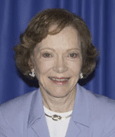Carter faults the nation on its immunization failures; calls for registries as a partial remedy
Saying that child immunization rates in America are a disaster, former First Lady Rosalynn Carter on Monday called for universal immunization registries.

Saying that child immunization rates in America are a disaster, former First Lady Rosalynn Carter on Monday called for universal immunization registries.
"Only 31% of private providers use immunization registries," Ms. Carter said in the keynote address to the AAP 2004 National Conference and Exhibition in San Francisco. "We are all working to make sure that children get a good start in life. Registries are the only way to ensure that children get the immunizations they need."
All 50 states have immunization registries, but almost none are functioning as intended. The result is clear and potentially disastrous, Ms. Carter warned. Only 79% of American children receive all recommended immunizations - well below the 90% threshold generally needed to prevent epidemics.
"Every time there is an outbreak, people get excited, and immunization rates go up," she continued. "Then people lose interest and rates fall. Then you have to start all over again. It's time to do it right. We have to institutionalize childhood immunization and immunization registries."
The overall success of immunization programs may be their worst enemy. Most younger parents have never experienced or seen diseases such as measles and whooping cough. That makes it easy to assume that many childhood diseases have disappeared and difficult to remember to get their own child immunized, Ms. Carter noted.
Pediatricians work hard to immunize their patients according the recommended childhood schedule, but that's a difficult, sometimes impossible, job as many families move from community to community or in and out of health plans. For the millions of children who are uninsured, there are only limited opportunities to receive immunizations.
"It is clear that we do not do what we should for our children," Ms. Carter said. "Pediatricians do a good job for those who come to see them, but that's only a few children. We are talking about everybody working together: schools, medical care, social services, community, parents. With the right efforts, even children at high risk can be cared for and grow up without problems."